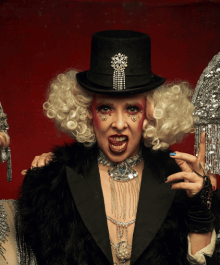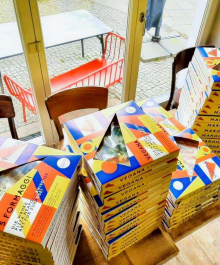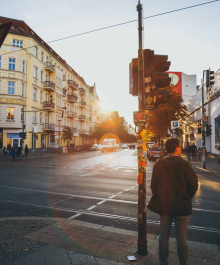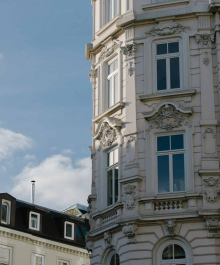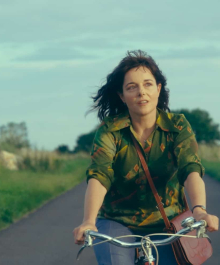
In 2008 Snow Patrol recorded their new album in Berlin. We will be publishing some of their quotes on Berlin in the next days. Prior to their live concert in Berlin on the 23rd of may. Have fun!
[wpvideo BFSKOc9M]
SNOW PATROL
BIOGRAPHY 2008
The main thing to get about Snow Patrol is that, 14 years after they started out as a student band at Dundee University, they’re still flying, gloriously and unpredictably, by the seat of their pants. “The great and terrifying thing about our band,” declares their leader and main songwriter Gary Lightbody, “Is that everything has always happened as it’s going along. There’s been very little masterplan. We allow things to happen as much by accident as by deliberate intention.”
One notable early accident was their name. Lightbody’s band used to be known as Polar Bear – hence their 1998 debut album Songs For Polarbears – but were obliged to change it after discovering that this was what the bassist of Jane’s Addiction was calling his side project. ‘Snow Patrol’ had already been chosen for them by a friend who didn’t care for the Polar Bear moniker; and so it came to pass that Snow Patrol signed in
1995 to the Jeepster label, home of their Glaswegian indie heroes at the time, Belle and Sebastian.
Now that the band have become feted as commercial giants – their last album Eyes Open was the UK’s best-seller of 2006, it’s worth remembering that Snow Patrol spent the 1990’s so broke that at one low point Lightbody had to sell his record collection to pay the rent. Jeepster finally dropped them in 2001 after their second album, the presciently titled When It’s All Over We Still Have To Clear Up, failed to connect beyond their passionate but stubbornly tiny fanbase. “We spent 10 years making records that 6000 people bought,” Lightbody confirms. “Success to us isn’t a chart thing, it’s when you turn up to play a gig and find the place is full.” In the early days, their largest audiences were back in Ireland, the country where Bangor-born Lightbody grew up before moving to Scotland as a student. “We’re very lucky in that we seem to have three home town audiences in Belfast, Dublin and Glasgow, although we get an extraordinary reception whenever we play anywhere in Ireland or Scotland.”
Snow Patrol began to get considerably bigger all over the UK and in America after signing to the Fiction label in 2003 and hooking up with the producer Garrett ‘Jacknife’ Lee. “An amazing influence,” in Lightbody’s estimation, “Jacknife has become like an indispensable member of the band. I can’t imagine working with any other producer.”
Under Lee’s inspired guidance, Snow Patrol and their increasingly charismatic vocalist Lightbody, shed some of their indie rough edges and began to hone their pop smarts. In 2003 they released Final Straw their first number one album, which yielded the band’s first top 5 hit, Run. It also won them the inaugural Ivor Novello for best album in 2004.
In 2005 they moved into a remote studio in the middle of Ireland, Grouse Lodge, and completed Eyes Open, home of one of the most emotionally potent tunes of the 21st century, Chasing Cars. With over 100,000 radio plays in the UK, 2m downloads in the US, and the accolade of ‘Best Song of All Time’ from the listeners of Virgin Radio, Chasing Cars also had the rare distinction of closing the BBC’s long running TV chart show Top Of The Pops in July 2006. The effect on the Eyes Open album was phenomenal, leading to a final sales tally of 4.7m copies worldwide.
At this point most similarly blessed bands would probably have either taken a long, expensive holiday, or re-grouped for another assault on the global pop charts. Lightbody and co did neither, opting instead to call up Jacknife Lee and make an album which took them on an unexpected creative odyssey from Galway in the West Of Ireland, back to Grouse Lodge in County Meath and on to the legendary Hansa studio in Berlin where Bowie and many other luminaries from the 1970’s recorded seminal work. In line with the innovative traditions of the studio the album, A Hundred Million Suns, is Snow Patrol’s most ambitious and exhilarating collection so far; and one in which Lightbody feels his band has, accidentally of course, squared its own circle.
“This is our most complete record by far. A Hundred Million Suns sounds like the marriage of everything we learned from the Jeepster years and the Fiction years made into something new and bolder. Our spikiness and our indie-ness are coming through again with all the poppiness of the last two records. There’s a lot of melody here and you can’t cloak that whatever you do with it. This album is touched by our entire history, and hopefully sounds like our future too.”
Q and A with Gary Lightbody on the making of A Hundred Million Suns
Q Why did you decide to record half the album in rural Ireland, and the rest at Hansa studio in Berlin?
A We wanted a contrast between the rural environment of Grouse Lodge, which really is in the middle of nowhere, where we were sequestered for 7 weeks, and the headlong city life. It was a complete change of pace. After 6 weeks at Grouse Lodge, idyllic as it was, we were stagnating. Plus our producer Jacknife Lee had always wanted to work in Hansa, and we knew the history of the place, with Bowie and the Krautrock crowd from the 70’s. It gave us a chance to kill a lot of birds with the same stone.
Q Did you find you made very different music in the two studios you used?
A There was definitely a very different attitude and energy in Berlin. We’ve recorded in a city before. We did Final Straw in London but because we knew London so well that wasn’t particularly energising. Whereas Berlin was a new adventure. It’s an incredible place and it had a galvanising effect on the record. It was where most of the songs started to make sense to us.
Q Was Berlin the reason for the single, Take Back The City?
A Well it was written in Grouse Lodge, would you believe, and it’s a song inspired by Belfast! But the rawness of the song came from Hansa and Berlin.
Q Sonically this is a very different album from your last two…
A Yeah definitely. We had three or four weeks in the two Hansa studios, Hanza Ton and Hanza Platz. ‘Platz’ is where all the great 70s recordings were done and ‘Ton’ is two floors down from there and is usually a dance/electro studio so it’s the perfect place for Jacknife to let his imagination run wild. Hansa Platz still has a lot of the old equipment.
There’s a strong feeling that a lot of important musical history went down there. But it’s a relaxing place to work, because it has lots of windows, a lot of natural light and a great energy.
Q Did the enormous success of your last album, Eyes Open, affect the way you approached A Hundred Million Suns?
A I don’t think it did really, other than as part of a process whereby as a band we’ve got better at being in the studio. We didn’t used to like recording at all. This last experience was our happiest I think. We really made the record we intended to make. Jonny and Nathan and Tom really worked hard on their instruments to get where we needed to be.
Pablo is already a very gifted musician on many instruments and I spent more time on my lyrics so between us this time i think we were a much stronger musical unit, and edited them more carefully than I used to. Jacknife had a ball. I think he’ll be going back there with other bands.
Q Did you feel that on this album you needed to come up with a hit to rival Chasing Cars?
A We love that song and the freedom it’s given us, but what we tried to do this time was to use that freedom wisely rather than come up with another song like it. There’s no point in retracing our steps. That would have been safe, but we wanted to make an album that would be more challenging to us and the listener than anything we’ve done before. Eyes Open couldn’t have had a 16 minute track like The Lightning Strike. It was a positive reaction to Chasing Cars.
Q Where did you write the songs for this album?
A I write all the time. We chose the 20 songs we wanted to record when we went to County Galway, and stayed in a house on the banks of Lough Corrib for 6 weeks. Then we moved to Grouse Lodge
Q How do you feel about your lyrics on this record?
A This is the first time I’ve got this close to the release date and not wanted to change anything! I think they’re the best I’ve written. I’ve tried to pick up more themes this time. Every other album was mostly about the break-down of relationships.
Gary Lightbody on A Hundred Million Stars TRACK BY TRACK
1 If There’s A Rocket Tie Me To It
This is a love record rather than a break up record, but wonderful as that may be, it’s set in the context of a world that’s as terrifying as it is beautiful. Which is why a lot of the imagery refers to space. As in ‘get us out of here.’ I don’t think we’re doomed, but there’s darkness here, looming over me rather than in me.
2 Crack The Shutters
This is the purest love song I’ve ever written. Even more so than Chasing Cars. It’s luxuriating in the beauty and wonder of someone you love with all your heart.
3 Take Back The City
This was inspired by Belfast and Northern Ireland in general but it can be about any city and the relationship everybody has with the place where they’re from. It’s about the reasons why i grew up confused by my country and the reasons now why i love it so. The place where we are from (and sometimes it is simply by pushing against it) has a great impact on the type of person we become.
4 Lifeboats
Griff Rhys from Super Furry Animals is a hero of mine and he is a master of abstract and colourful imagery and i guess he inspired the approach i had to Lifeboats. My songs in the past are rooted in very much in the real but on this record i finally broke away from that pattern and looked to my dreams and slightly skewed imagery rather than relying on specifics. This is dream I had about a tree that stretched out like veins in all directions, up and down and out and across and ended up looking like dark cracking ice and from above it made the shape of me and someone which got a bit frightening. Normally i forget my dreams but i wrote that one down.
5 The Golden Floor
The lyric is self-explanatory, a love song, but the arrangement is unusual. It started out with me on guitar and voice and then Jacknife put these weird drums across it which meant sonically we could go places we’ve never been before. The thwack on the snare in the chorus is made by a giant plant.
6 Please Just Take These Photos From My Hand
This is an anomaly on the record in that it could be construed as a break-up song, but it’s actually about my past life and those people whose faces you carry around like snapshots in boxes. It’s about me losing my history. I was worrying about my memory while I was making this record as it seems to be deserting me rapidly.
7 Set Down Your Glass
I don’t normally lie but there’s a lie in this song. ‘I painted this.’ I don’t paint. But it sounds much better than ‘I wrote this.’ And it’s less intrusive as a way of saying how much this moment, this person, means to me.
8 The Planets Bend Between Us (For You)
Prosaic as it may sound, this song is about my house in Northern Ireland which is on Belfast Lough beside a little beach. There’s something about being on a beach in winter time, no-one else is there, it’s blowing a gale, raining sideways, and there’s something redemptive about yelling into the wind. The line in the song ‘ a hundred millions suns’ just cried out to be the album title. It captures the vastness of the universe and us as tiny dots within it. And it expresses the big sound of the record and it puts it all into perspective.
9 Engines
This was written in Galway. It’s another love song but it concerns two very different feelings, which are indicated by the tightness of the verse and the openness of the chorus. The lyrics in the verse seem to be asking, demanding, the music to open up and burst/explode.
10 The Disaster Button
It’s about losing the run of yourself, as simple as that really. I’m not glorifying anything, quite the opposite. The female figure in it is the benchmark of cool, calm and aspriational. All the women in my songs tend to be just that as it is very often me that is the opposite.
11 The Lightning Strike
This was written in 3 parts. We can’t write a 16 minute song just like that as it takes an almost zen like state to achieve without losing your place or going quite mad but these 3 songs worked so well together it was obvious they belonged in one place. The brass and the choir in the first part, What if This Storm Ends, is quite a moment, recorded at Olympic Studio in London. The middle section ‘Sunlight’ is set on the very west coast of Ireland. The last part Daybreak was really affected by Hansa. It has that Krautrock hypnotic sway to it, and heroes-type guitars swooning over the top. It’s a fitting end to the record because of that.
To see all videos just click here.
